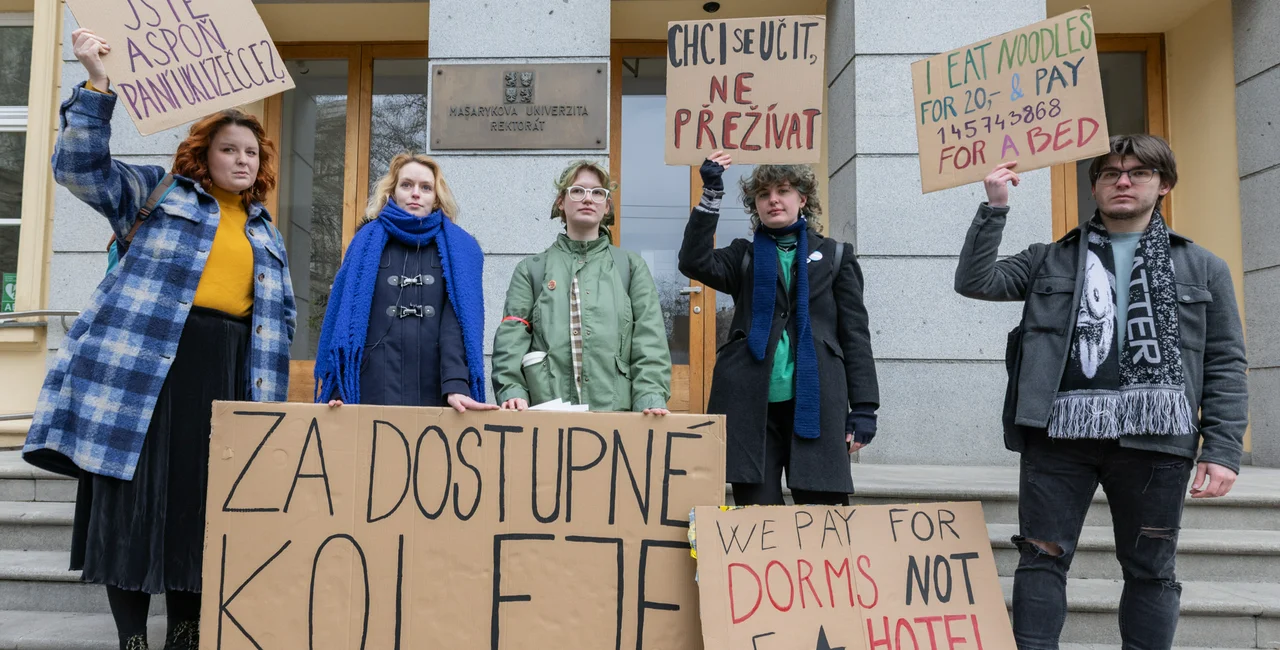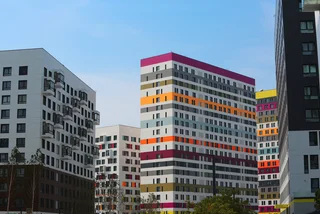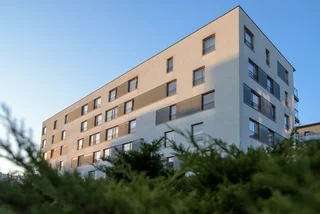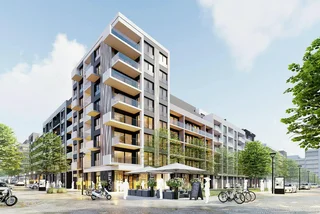Students at Brno’s Masaryk University (MU) are under stress – and not only because of exams. Continually rising dormitory prices have frustrated many, leading to a protest held in the center of Brno recently to voice serious concerns about the months ahead. The events at MU are representative of students across the nation feeling financial unease about ever-higher dorm prices.
Sharp rises in recent months
At present, a bed in a dorm at MU now costs CZK 2,500 more than in the previous academic year. This follows a series of price rises by the university: last summer, rent went up by one-third, in February by 15 percent and a further increase of 10 percent is planned for July 2023. At the same time, nominal wages nationwide have grown by just 6 percent.
Around 1,000 students at MU had signed a petition to address the sharply rising rent prices and ask for them to be reversed. University authorities, however, found their demands unfeasible. The Za dostupné koleje (For affordable dorms) student organization at MU then found no other option but to protest in Brno to make themselves heard; around 50 dissatisfied students attended a demonstration last month.
“Right now you can find a shared room in a flat cheaper than I pay for a shared room in an MU dormitory.” – co-organizer of the protest, Veronika Hrtoňová.
Value for money? Not quite
Veronika Hrtoňová, a student at MU, does not see how further price rises can be justified. According to her, higher rents would simply make dormitories too expensive for the (below-average) quality offered. Participants of the strike drew attention not only to high costs, but also the poor value for money.
Pauline, a student from France, said in Seznam Zprávy that conditions in the MU dorms were sub-par. “Half of the stoves are not working, and the microwave and the washing machines don’t always function.” Andrej from the Czech Republic similarly complained: “we have no hot water in the room, the windows are draughty, and the toilets and showers are shared.”
“We pay for dorms, not a five-star hotel…I want to study not survive.” - A student at the protest.
Another point of consideration is that prices of shared dorm rooms are soon catching up to single rooms in private apartments. A room in an MU dorm can cost up to CZK 6,500, and one can rent a single room in Brno for around CZK 7,500 to 8,000. Ema, a student who lives in a Brno dorm, admits that renting a private room in a flat “is a bit more expensive, so it wouldn't solve my problem, but at least I would have more privacy and comfort.”
A strain on personal finances
International students (40 percent of whom live in student dorms in Czechia) too have felt the brunt of rent increases at MU. Co-author of the petition, Seul, observed that “foreign students come here to study due to low tuition fees and living costs, but the current scenario is different. Getting a job in Brno for foreign students is quite difficult because of the language barrier."
Daniela, an internship student from Mexico, similarly said: “I receive CZK 9,000 per month. When I first came to Brno, this was enough to cover my rent, groceries, transport, and more. Now my parents have to give me money and I needed to find a job.” A study that found Czechia has one of the highest proportions of students in Europe working alongside their studies – more than 9 in 10 – goes to show the fragile financial position many find themselves in.
Amid the backdrop of an inflationary environment – reaching over 15 percent on average in 2022 – it is little surprise that the cost of dorms has increased so rapidly. In Prague, for example, rental prices rose by around one-fifth in 2022 – a rate that was broadly representative of the whole country. A major reason for university dorms pushing up prices is higher operational costs – at the start of this year electricity prices had grown by over 36 percent year on year.
Can, and should, prices be reduced?
According to the MU vice-rector for internationalization, Břetislav Dančák, finding a solution to the problem is problematic. “Nothing can be done about it [the rent increase] because the university has no money, and it would be unfair to help only students in the dorms and not all at the university,” he explained. Moreover, he added that dormitory housing isn’t quite unaffordable per se yet, as students continue to show strong interest in it amid record-high demand.
Students stress that the argument of high energy prices is not relevant anymore, because they have already reached their peak (and are indeed on a decline), government price caps have been implemented, and dormitories save energy regardless by maintaining the same internal temperature in each building to avoid overheating.
“We think that after the large increase that occurred last July, another 15-percent rise is too much and puts already vulnerable students in much trickier situations.” - Students who signed the MU petition.
Moreover, the students are also concerned about an inflation clause attached to every accommodation agreement, which allows dormitories to increase fees annually depending on the inflation rate. Students ask to make it only as high as the rate of (nominal) wage increases.
“Although the inflation increase was agreed upon in November, we didn't know about it until Jan. 20.” The petition accuses the university of a lack of transparency. MU authorities claim that students should have been prepared for the price increase because it was mentioned in accommodation contracts, but Hrtoňová says that “it was approved when no one could even imagine 15-percent inflation.”
A helping hand – but is it enough?
Students at MU can apply for scholarships – but they may not be enough. MU spokesperson Radim Sajbot has said that the university paid about CZK 102 million in accommodation scholarships in 2022. However, the university provides accommodation scholarships worth about CZK 3,100 per semester, per person – or just CZK 600 per month.
Although Czech Republic universities offer tuition-free education, the amount of loans, grants, and scholarships given to citizens is often modest. Just "a very tiny fraction" of students obtained scholarships, which offer "very minimal" financial assistance, according to a 2021 study from the Institute for Democracy & Economic Analysis.
A reflection of a wider trend
MU is by no means the only university bumping up dormitory fees. Czech Technical University at the beginning of March raised prices by 15 percent, which followed on from a 16-percent increase last September. The Technical University of Ostrava also recently declared that it would raise dormitory prices by 10 percent from July.
At the start of this academic year, Charles University lifted rents by 9 percent, and the University of Chemistry and Technology in Prague previously announced plans to hike rents in line with the current double-digit inflation. The University of South Bohemia in České Budějovice raised fees by 15 percent at the beginning of the academic year.
With inflation set to remain above 10 percent in 2023, students in Brno – and nationwide – are understandably worried about the future of university dorm prices in the coming months. It is now either up to the universities, or even the government, to enact policies that will alleviate financial issues – if at all possible.












 Reading time: 5 minutes
Reading time: 5 minutes 































